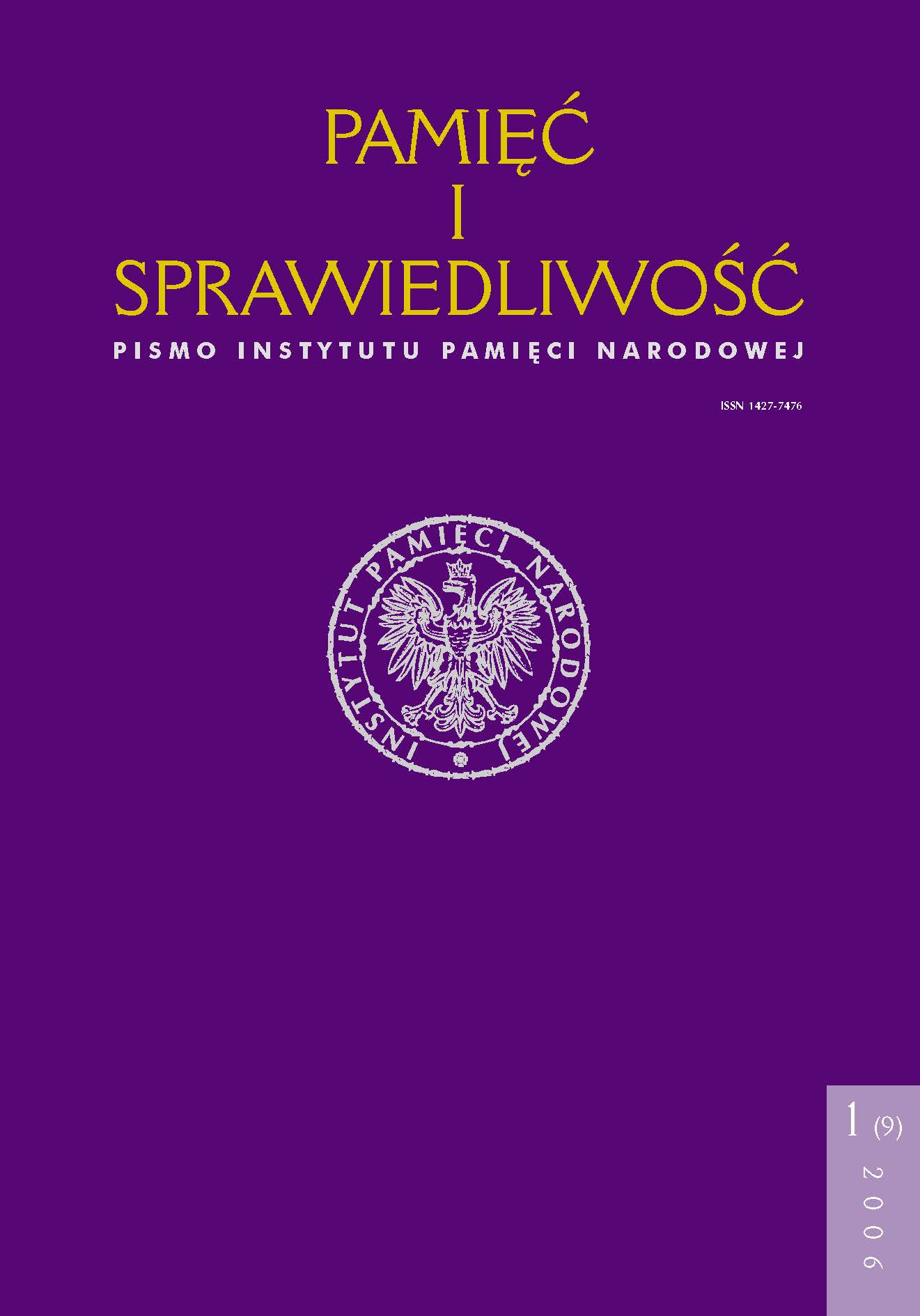Operacja kryptonim „Jocker“. Rozpracowanie Agencji Prasowej „Solidarności” przez Służbę Bezpieczeństwa
Pamięć i Sprawiedliwość, V. 9 N. 1 (2006), pages: 357-378
Publication date: 2006-06-30
Abstract
The Solidarity Press Agency was launched during the First Nationwide Congress of Trade Union Press, which took place January 24–25 1981 in the Huta Katowice steelworks. The Security Police became interested in it almost immediately. The first information about it comes from the beginning of February. Although the formal uncovering was not finished before 1985, most surveillance work targeted at the agency and the people involved in activities was practically completed in the first half of 1982.
Using operational procedures, Security Police functionaries, with the help of collaborators, closely watched the work of Solidarity Press Agency, the people connected with it and papers published by the agency, especially the Bulletin of Trade Union Papers,
„because of the real threat of smuggling anti-socialist views and opinions in journalism”.
In the case of the agency’s surveillance, contrary to e.g. the Solidarity weekly, the Security Police relied on a group of people, the substantial part of which was involved in the resistance movement. It was even more difficult for the Security Police to work during the Solidarity heydays, because they found it harder to recruit agents. It also happened that the people already recruited refused to continue to cooperate. Although it succeeded in planting a spy nicknamed „Misio” among the members of auxiliary staff, but that contact was able to provide the Security Police with scant information of a general nature.
Not surprisingly, although the functionaries had broad general knowledge about the activity of the agency, they had little influence on its work. One can venture the opinion that like in the case of other links of legal Solidarity, the security police had no time for
detailed surveillance of the Solidarity Press Agency.
Puoi leggere altri articoli dello stesso autore/i
- Grzegorz Majchrzak, Tomasz Kozłowski, Rozmowy ppłk. Władysława Iwańca z przewodniczącym NSZZ „Solidarność” Lechem Wałęsą , Pamięć i Sprawiedliwość: V. 31 N. 1 (2018)
- Grzegorz Majchrzak, Bogusław Kopka, Raport "O służbie bezpieczeństwa publicznego" z 1946 roku , Pamięć i Sprawiedliwość: V. 3 N. 1 (2003)
- Grzegorz Majchrzak, Działalność wymiaru sprawiedliwości w sprawach politycznych w stanie wojennym , Pamięć i Sprawiedliwość: V. 43 N. 1 (2024)
- Grzegorz Majchrzak, Prawdziwa solidarność zamiast deklaratywnej przyjaźni. Polskie protesty przeciwko inwazji wojsk Układu Warszawskiego na Czechosłowację w 1968 r. , Pamięć i Sprawiedliwość: V. 35 N. 1 (2020)
- Grzegorz Majchrzak, [Recenzja] Stan wojenny w Polsce. Dokumenty i materiały archiwalne 1981-1983, praca zbiorowa pod red. Tadeusza Walichnowskiego, Wydawnictwo Commandor, Warszawa 2001, ss. 488 , Pamięć i Sprawiedliwość: V. 1 N. 1 (2002)
- Grzegorz Majchrzak, Rozmowy z „Panem Cogito”. Zbigniew Herbert na celowniku peerelowskiego wywiadu , Pamięć i Sprawiedliwość: V. 33 N. 1 (2019)
- Grzegorz Majchrzak, Początki „ochrony” NSZZ „Solidarność” przez Służbę Bezpieczeństwa (wrzesień 1980 – kwiecień 1981) , Pamięć i Sprawiedliwość: V. 4 N. 2 (2003)
- Grzegorz Majchrzak, [Recenzja] Andrzej Paczkowski, Droga do „mniejszego zła”. Strategia i taktyka obozu władzy lipiec 1980–styczeń 1982, Wydawnictwo Literackie, Kraków 2002, ss. 331 , Pamięć i Sprawiedliwość: V. 2 N. 2 (2002)
 Język Polski
Język Polski
 English
English
 Deutsch
Deutsch
 Français (France)
Français (France)
 Italiano
Italiano
 Русский
Русский


 PDF (Język Polski)
PDF (Język Polski)
